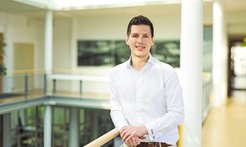Adrian Bunzel joins the Max Planck Institute for Terrestrial Microbiology (MPI-TM)
The biochemist is further enhancing research in Marburg with new approaches to carbon capture and sustainable energy production
Starting in July 2025, Dr Bunzel will relocate from ETH Zurich to the Max Planck Institute for Terrestrial Microbiology in Marburg, Germany. He will be working as one of two group leaders researching carbon capture at the Max Planck Society. The aim of his research is to develop biological technologies that use sunlight to capture CO2 from the atmosphere.

Enzymes are nature's catalysts — they accelerate biochemical reactions and thus enable life. In Marburg, Adrian Bunzel will develop new enzymes that use sunlight as an energy source to fix carbon. 'Climate change requires decisive action – sustainability has long been a concern of mine. Throughout my scientific career, I have often contemplated how solar energy and biochemistry can be integrated to achieve this,' says Adrian Bunzel.
In order to equip enzymes with the capability to use sunlight as an energy source, the researcher is employing two advanced methods: computational protein design (i.e. the computer-aided development of new proteins) and directed evolution (a technique that mimics natural evolution in the laboratory to enhance enzymes through targeted mutation and selection). Both methods have won the Nobel Prize in recent years, with AI-assisted protein design being recognised in 2024.
Adrian Bunzel uses protein design to modify enzymes so that they bind organic photocatalysts and can therefore use light as an energy source. Based on this principle, he has developed photoenzymes for biological solar cells that convert sunlight into electrical energy. The first generation of these photoenzymes has been successfully tested, however, their efficiency is still about ten to a hundred times lower than that of conventional silicon solar cells. Dr Bunzel is optimistic, stating, “Directed evolution has enabled comparable improvements in other enzymes in the past. That is precisely what we aim to achieve in Marburg.”
Building on these initial breakthroughs, Adrian Bunzel is now addressing further challenges at the Max Planck Institute for Terrestrial Microbiology. He intends to combine photocatalysts with enzymes that can fix CO₂. “We are equipping enzymes that can already capture CO₂ with the ability to use solar energy,” he explains. ‘Natural photosynthesis is complex and consists of many individual steps, during which large amounts of energy are lost. Ultimately, nature only uses around one percent of the captured solar energy. Our approach is more direct and therefore potentially much more efficient.”
The interdisciplinary research landscape in Marburg offers ideal conditions for Dr. Bunzel's research. ‘It takes a long time to develop the enzymes we want to use in the laboratory. Here in Marburg, numerous experts have extensive experience with these systems, including Prof. Tobias Erb, Dr. Jan Schuller, Dr. Johannes Rebelein and Dr. Seigo Shima. We can benefit immensely from their expertise,' says Adrian Bunzel.
He recognizes significant potential in his field of research for addressing key societal challenges such as renewable energies, carbon fixation, and sustainable food production. ‘Meeting humanity's energy needs from sustainable sources will be one of the greatest challenges of the 21st century,’ he says. ‘I look forward to contributing to new solutions here in Marburg.’












